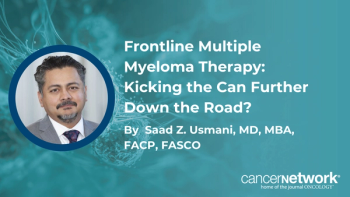
Oncology NEWS International
- Oncology NEWS International Vol 4 No 10
- Volume 4
- Issue 10
Needle Exchange Programs Lower HIV Risk: Panel
WASHINGTON-Programs designed to encourage drug addicts not to share needles can help reduce the spread of HIV, a National Academy of Sciences panel said in its report to Congress. The report may pave the way for a change in government policy to allow the use of federal funds to support such programs.
WASHINGTON-Programs designed to encourage drug addicts not toshare needles can help reduce the spread of HIV, a National Academyof Sciences panel said in its report to Congress. The report maypave the way for a change in government policy to allow the useof federal funds to support such programs.
The panel, organized by the academy's National Research Counciland the Institute of Medicine, said that exchange programs orprograms that distribute bleach to addicts for use in sterilizingneedles can effectively decrease the risk of HIV without encouragingdrug use.
Dr. Lincoln E. Moses, chairman of the panel and professor emeritusat Stanford University, said that a New Haven, Conn, program sawa one third decrease in the rate of HIV contamination in needlesturned in for exchange. A Tacoma, Wash, program showed an eightfolddecrease in hepatitis, which can be used as an indictor of HIVamong IV drug users.
Bonding Ritual or Necessity?
The report also put to rest the notion that addicts share needlesas a form of bonding ritual and would not stop the practice evenif new needles were available. Dr. Steven Koester, an anthropologistat the University of Colorado, told the panel that addicts shareneedles out of necessity to avoid being caught carrying illegaldrug paraphernalia.
To get off the street as quickly as possible after purchasingdrugs, addicts go to a "shooting gallery" where onlyused needles are available. If new needles were accessible andlegal, addicts would use them, not only to avoid the risk of HIVinfection but also the discomfort and damage to veins caused byblunted or clogged needles, Dr. Koester said.
Articles in this issue
over 30 years ago
New Markers May Help Predict Course of Prostate Carcinomaover 30 years ago
Computerized Database Could Lead to Improved Staging of Lung Cancerover 30 years ago
Centocor Wellness Program Includes Mobile Mammography Vanover 30 years ago
Institute of the Future Urges US to Increase Spending on Basic R&Dover 30 years ago
Yeast-Derived GM-CSF (Leukine) Cleared for Use in Older AML Patientsover 30 years ago
Spiral CT Offers Better Detection of Disease, More Accurate Stagingover 30 years ago
New Colon Ca Agent Is Available in Franceover 30 years ago
New Dual Antibiotic Effective Against Changing Hospital FloraNewsletter
Stay up to date on recent advances in the multidisciplinary approach to cancer.






































